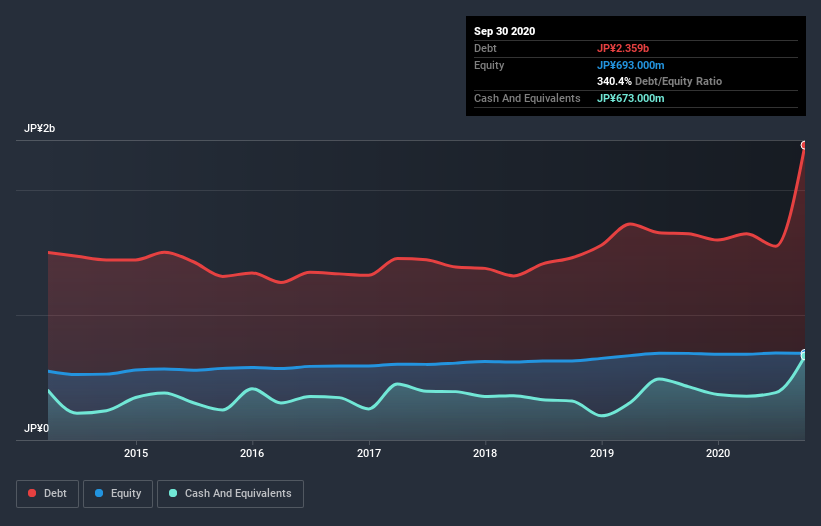
The external fund manager backed by Berkshire Hathaway's Charlie Munger, Li Lu, makes no bones about it when he says 'The biggest investment risk is not the volatility of prices, but whether you will suffer a permanent loss of capital.' When we think about how risky a company is, we always like to look at its use of debt, since debt overload can lead to ruin. As with many other companies Truck-One Co., Ltd. (FKSE:3047) makes use of debt. But is this debt a concern to shareholders?
Why Does Debt Bring Risk?
Generally speaking, debt only becomes a real problem when a company can't easily pay it off, either by raising capital or with its own cash flow. In the worst case scenario, a company can go bankrupt if it cannot pay its creditors. While that is not too common, we often do see indebted companies permanently diluting shareholders because lenders force them to raise capital at a distressed price. Having said that, the most common situation is where a company manages its debt reasonably well - and to its own advantage. The first thing to do when considering how much debt a business uses is to look at its cash and debt together.
View our latest analysis for Truck-One
How Much Debt Does Truck-One Carry?
As you can see below, at the end of September 2020, Truck-One had JP¥2.36b of debt, up from JP¥1.65b a year ago. Click the image for more detail. However, it does have JP¥673.0m in cash offsetting this, leading to net debt of about JP¥1.69b.

How Strong Is Truck-One's Balance Sheet?
According to the last reported balance sheet, Truck-One had liabilities of JP¥2.64b due within 12 months, and liabilities of JP¥1.02b due beyond 12 months. Offsetting this, it had JP¥673.0m in cash and JP¥189.0m in receivables that were due within 12 months. So its liabilities total JP¥2.80b more than the combination of its cash and short-term receivables.
This deficit casts a shadow over the JP¥554.1m company, like a colossus towering over mere mortals. So we definitely think shareholders need to watch this one closely. After all, Truck-One would likely require a major re-capitalisation if it had to pay its creditors today.
In order to size up a company's debt relative to its earnings, we calculate its net debt divided by its earnings before interest, tax, depreciation, and amortization (EBITDA) and its earnings before interest and tax (EBIT) divided by its interest expense (its interest cover). Thus we consider debt relative to earnings both with and without depreciation and amortization expenses.
Truck-One shareholders face the double whammy of a high net debt to EBITDA ratio (9.7), and fairly weak interest coverage, since EBIT is just 1.5 times the interest expense. This means we'd consider it to have a heavy debt load. Even worse, Truck-One saw its EBIT tank 77% over the last 12 months. If earnings continue to follow that trajectory, paying off that debt load will be harder than convincing us to run a marathon in the rain. When analysing debt levels, the balance sheet is the obvious place to start. But you can't view debt in total isolation; since Truck-One will need earnings to service that debt. So when considering debt, it's definitely worth looking at the earnings trend. Click here for an interactive snapshot.
But our final consideration is also important, because a company cannot pay debt with paper profits; it needs cold hard cash. So we clearly need to look at whether that EBIT is leading to corresponding free cash flow. During the last three years, Truck-One burned a lot of cash. While investors are no doubt expecting a reversal of that situation in due course, it clearly does mean its use of debt is more risky.
Our View
On the face of it, Truck-One's EBIT growth rate left us tentative about the stock, and its level of total liabilities was no more enticing than the one empty restaurant on the busiest night of the year. And even its net debt to EBITDA fails to inspire much confidence. Considering everything we've mentioned above, it's fair to say that Truck-One is carrying heavy debt load. If you play with fire you risk getting burnt, so we'd probably give this stock a wide berth. The balance sheet is clearly the area to focus on when you are analysing debt. However, not all investment risk resides within the balance sheet - far from it. Take risks, for example - Truck-One has 4 warning signs (and 2 which are a bit unpleasant) we think you should know about.
If, after all that, you're more interested in a fast growing company with a rock-solid balance sheet, then check out our list of net cash growth stocks without delay.
If you’re looking to trade Truck-One, open an account with the lowest-cost* platform trusted by professionals, Interactive Brokers. Their clients from over 200 countries and territories trade stocks, options, futures, forex, bonds and funds worldwide from a single integrated account. Promoted
Valuation is complex, but we're here to simplify it.
Discover if Truck-One might be undervalued or overvalued with our detailed analysis, featuring fair value estimates, potential risks, dividends, insider trades, and its financial condition.
Access Free AnalysisThis article by Simply Wall St is general in nature. It does not constitute a recommendation to buy or sell any stock, and does not take account of your objectives, or your financial situation. We aim to bring you long-term focused analysis driven by fundamental data. Note that our analysis may not factor in the latest price-sensitive company announcements or qualitative material. Simply Wall St has no position in any stocks mentioned.
*Interactive Brokers Rated Lowest Cost Broker by StockBrokers.com Annual Online Review 2020
Have feedback on this article? Concerned about the content? Get in touch with us directly. Alternatively, email editorial-team (at) simplywallst.com.
About FKSE:3047
Truck-One
Operates as a dealer of used vehicles in Japan and internationally.
Solid track record established dividend payer.
Market Insights
Community Narratives




